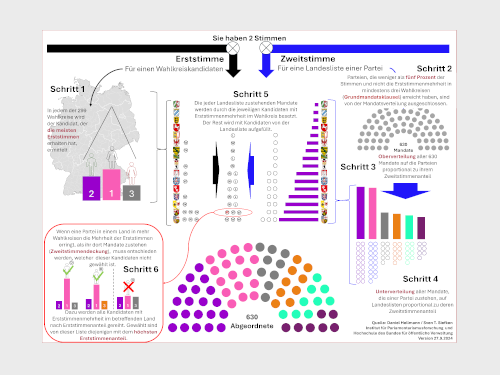When the Bundestag is re-elected in 2025, the new Bundestag electoral law will apply for the first time. In future - apart from very unlikely exceptional cases - there will be exactly 630 members of the Bundestag after the election. The reason why this rule can be adhered to is that overhang mandates will no longer arise in future. We explain exactly how this works Sven T. Siefken and Daniel Hellmann in the video opposite and in the publications below.
The next Bundestag will be elected according to a new Bundestag electoral law, which has been confirmed in key points by the Federal Constitutional Court. Daniel Hellmann sheds light on what the Federal Constitutional Court has confirmed and what it has rejected in the second IParl Current Focus.
Published in: IParl Current Focus No. 2.
On July 30, 2024, the Federal Constitutional Court of Germany ruled that the highly contested electoral reform passed in early 2023 was by and large in line with the constitution. Some details were immediately revised by order of the Court, but the more fundamental changes to the electoral law were approved. This is in line with previous decisions, strengthening the element of proportional representation. Is this the end to a never-ending story of electoral reform?
Published by American-German-Institute.
For more than 15 years now, the Federal Election Act has been undergoing constant reform. Now the Bundestag has passed its most extensive reform to date with the votes of the "Ampel" parliamentary groups. The opposition parties, above all the CDU/CSU and the Left Party, have sometimes harshly criticised the new law. But what does the reform change and what is it good for? In future, individual constituencies will probably have to make do without directly elected MPs. However, this does not mean that these constituencies and their voters will not be represented or that the representation of the Bundestag will deteriorate as a result. However, it remains questionable whether the cancellation of the basic mandate clause was a necessary reform step. All in all, however, it can be said that the new electoral law solves many problems, above all the enlargement of the Bundestag and negative voting weights.
Published in: IParl Current Focus No. 13.



Sign up to receive updates, promotions, and sneak peaks of upcoming products. Plus 20% off your next order.